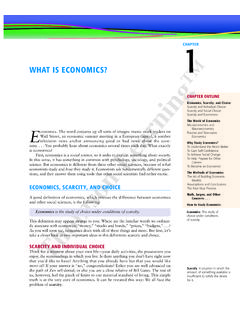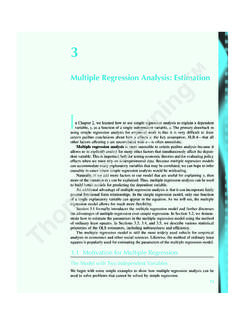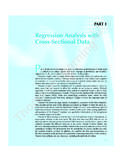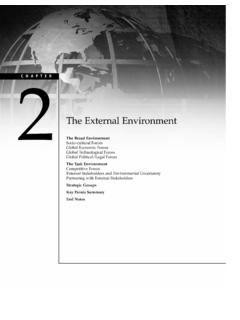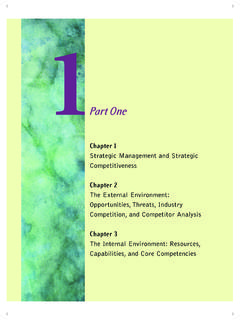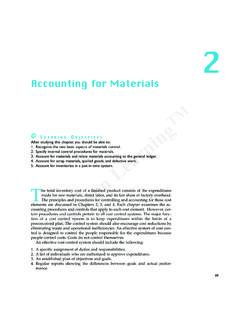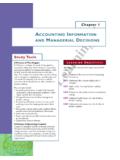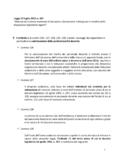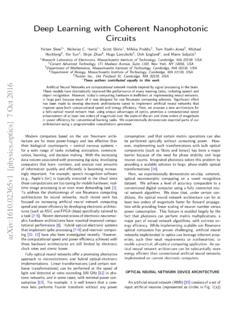Transcription of 1EARNINGS WHAT IS MANAGEMENT? - Cengage Learning
1 1 This chapter defines earnings management and explains the difference betweenlegal and illegal earnings management (commonly called cooking the books ).Earnings, sometimes called the bottom line or net income, are the single mostimportant item in financial statements. They indicate the extent to which a compa-ny has engaged in value-added activities. They are a signal that helps directresource allocation in capital markets. In fact, the theoretical value of a company sstock is the present value of its future earnings. Increased earnings represent anincrease in company value, while decreased earnings signal a decrease in the importance of earnings, it is no surprise that company managementhas a vital interest in how they are reported.
2 That is why every executive needs tounderstand the effect of their accounting choices so they can make the best possi-ble decisions for the must, in other words, learn to manage management may be defined as reasonable and legal managementdecision making and reporting intended to achieve stable and predictable financialresults. Earnings management is not to be confused with illegal activities tomanipulate financial statements and report results that do not reflect types of activities, popularly known as cooking the books, involvemisrepresenting financial executives face a lot of pressure to cross the line from earnings man-agement to cooking the books.
3 A1998 survey at a conference sponsored by CFO1 what IS EARNINGSMANAGEMENT?1 Lev, B. On the Usefulness of Earnings and Earnings Research: Lessons and DirectionsFrom Two Decades of Empirical Research. Journal of Accounting Research, 27 Supplement (1989): found that 78 percent of the chief financial officers (CFOs) in attendancehad been asked to cast financial results in a better light, though still using general-ly accepted accounting principles (GAAP). Half of them complied with therequest. Worse, however, 45 percent of the group attendees reported that they hadbeen asked to misrepresent their company s financial results and 38 percentadmit with intense pressure to report better earnings was confirmed by a similar sur-vey at a Business Week CFO conference.
4 It found that 55 percent of the CFOs hadbeen asked to misrepresent financial results, and 17 percent had IS EARNINGSMANAGEMENT?Research on earnings management suggests that this is a pervasive phenomenon:We estimate that 8-12 percent of firms with small pre-managed earnings decreas-es manipulate earnings to achieve earnings increases, and 30-44 percent of thefirms with small pre-managed losses manage earnings to create positive earnings(emphasis added). 3In other words, a large number of companies are using earn-ings management either to maintain steady earnings growth or to avoid reportingred study estimates that operating profits for the Standard & Poor s 500stocks have been inflated by at least 10 percent per year for the past two decades,thanks to a mix of one-time write-offs and other accounting tricks.
5 4 Since it iswidely accepted that operating profits are highly correlated to stock prices over thelong term, this means that the prices of S&P500 stocks, some of the best compa-nies in the world, have consistently been enhanced by earnings management tech-niques. The practice is indeed Electric (GE) was one of America s best-loved stocks as it achieved$ billion in earnings for fiscal year 2000. It had had a 482 percent total returnover the previous five-year period. GE s chief executive, Jack Welch, was consid-ered a management genius. He disputed the idea that the company managed earn-ings even using legal facts show that GE had, through fiscal year 2000, had 100 consecutivequarters of increased earnings from continuing operations.
6 This even surpassedWal-Mart s 99-quarter streak that ended in streak is one of the reasonsthat in 2001 GE had the stock market s biggest capitalization, $590 12 Earnings management , p. 1. June 12, , D., and I. Dichev. Earnings management to Avoid Earnings Decreases andLosses. Journal of Accounting and Economics, 24 (1997): Economic Focus: Taking the Measure. The Economist, November 24, 2001, p. , Jon. GE s Glowing Numbers. Accessed June 12, s earnings were so predictable they were almost a straight upward line. Inthe calendar year 2000, The Value Line Investment Survey gave GE its highestscore of 100 for earnings did GE do it?
7 One undeniable explanation is the fundamental growth ofits eight industrial businesses and 24 financial-services units. We re the best com-pany in the world, Dennis Dammerman, GE s chief financial officer, another explanation is earnings management , the orchestrated timing ofgains and losses to smooth out bumps and especially avoid a decline. Among bigcompanies, GE has long been known as a relatively aggressive practitioner ofearnings management , to quote Martin Sankey, a CS First Boston Inc. people believe that this type of long-run earnings increase just does nothappen by chance.
8 Reporter Jon Birger has said, GE has employed a number ofconfusing but apparently legal gimmicks to achieve its vaunted consistency. Nocompany, not even one as well managed as GE, has 100 quarters of uninterruptedgrowth without resorting to some fancy accounting or, as the mannered folks onWall Street like to call it, earnings management . 8 BYANYOTHER NAMEA number of phrases have been used to describe earnings management activities: Income smoothing Accounting hocus-pocus Financial statement management The numbers game Aggressive accounting Reengineering the income statement Juggling the books Creative accounting Financial statement manipulation Accounting magic Borrowing income from the future Banking income for the future Financial shenanigans Window dressing Accounting alchemyWhat Is Earnings management ?
9 36 The Value Line Investment Survey. Ratings and Reports. New York: Value LinePublishing Inc., April 14, 2000, p. , R., S. Lipin, and A. K. Naj. Managing Profits: How General Electric DampsFluctuations In Its Annual Earnings. Wall Street Journal, November 3, , GE s Glowing Numbers, above, n. is no standard, universally accepted definition for any of these use them in different ways and with different degrees of appreciation tocover a wide variety of activities, many perfectly legal. This tends to blurs the dis-tinction between entirely legal earnings management and illegally cooking EARNINGS MANAGEMENTThe definition of earnings management that we are using describes reasonable andproper practices that are part of a well-managed business that delivers value toshareholders.
10 Earnings management is primarily achieved by management actionsthat make it easier to achieve desired earnings levels through: Accounting choices from among GAAP. Operating decisions (sometimes called economic earnings management ).An example of a GAAP accounting choice would be whether a company should(a) be a voluntary early adopter of a new accounting standard or (b) wait two yearsuntil adoption of the new accounting standard is required of all of this type occurred when the Financial Accounting StandardsBoard (FASB) issued a new standard for pensions (FAS No. 87) effective in could choose to adopt the new standard as early as 1985.
